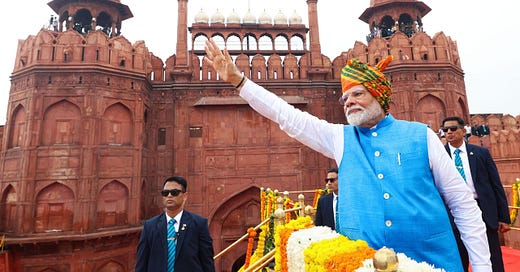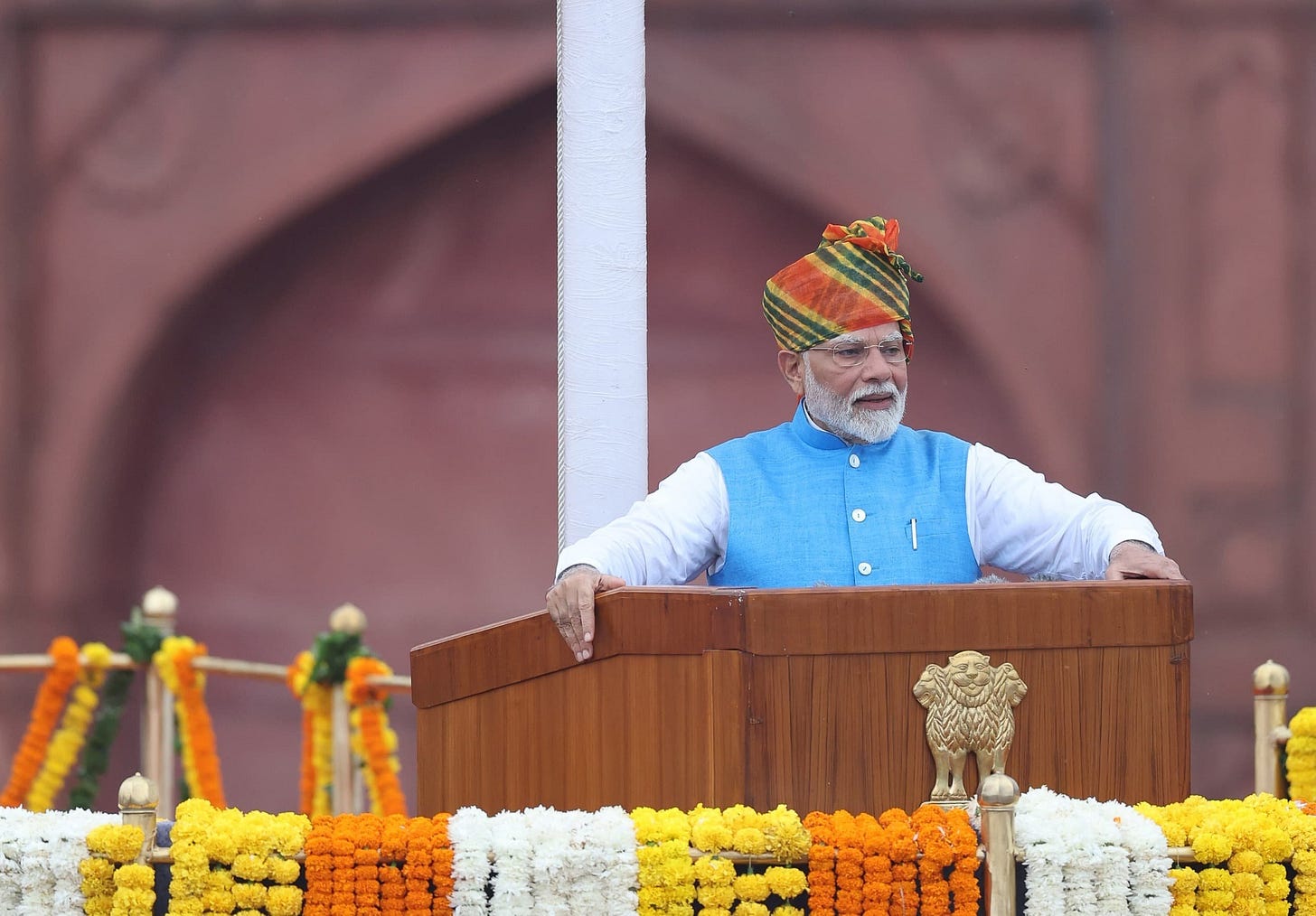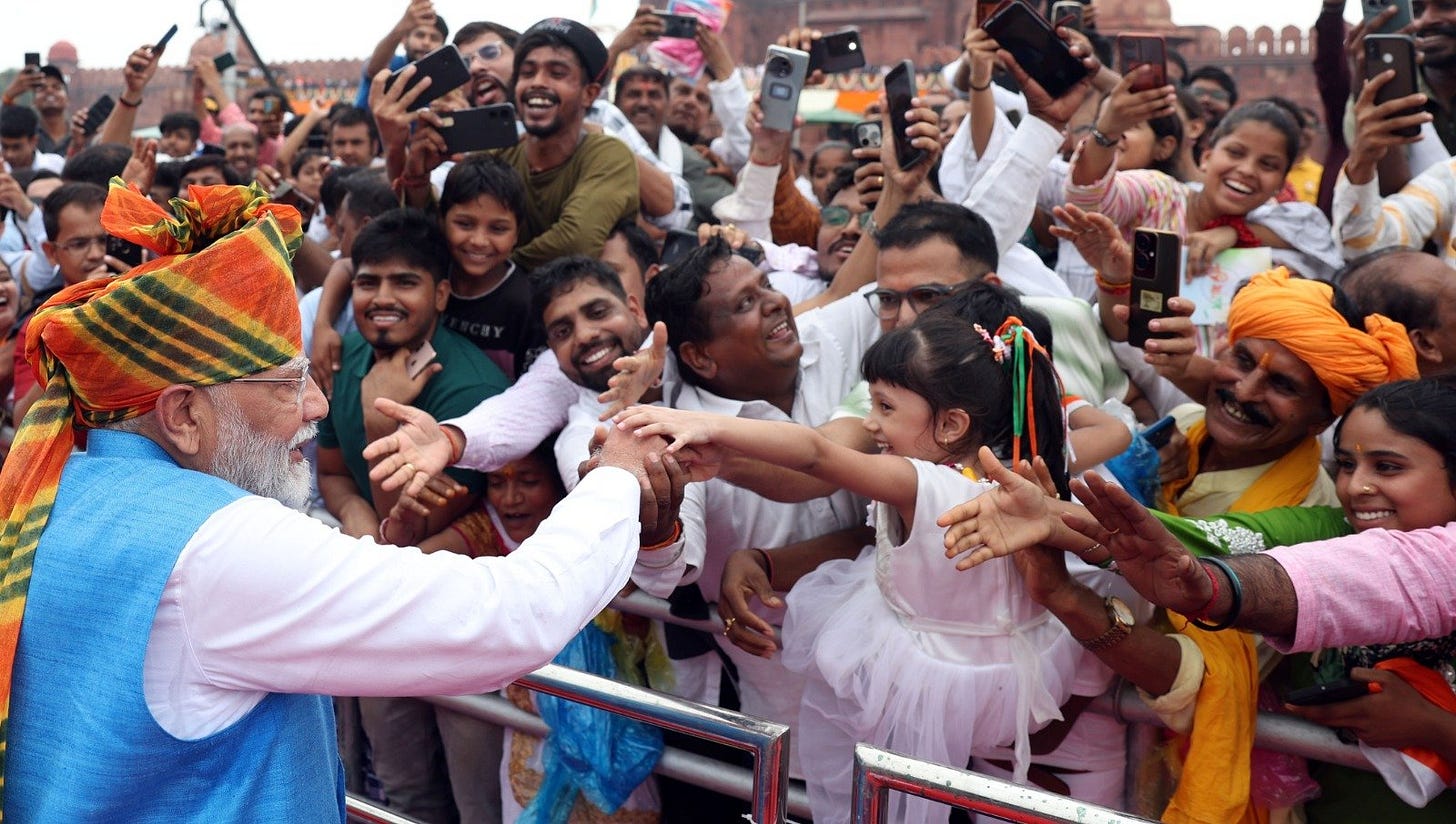PM's Eleventh Independence Day Address: 11 Key Highlights and 6 Areas We Hoped for More Insights
11th Successive Address from the Historic Red Fort
On the momentous occasion of India's 78th Independence Day, Prime Minister Shri Narendra Modi addressed the nation from the historic Red Fort. His speech, filled with gratitude, resolve, and a forward-looking vision, celebrated the country's achievements while setting the stage for future goals. Below are ten highlights from his address, reflecting the key themes and aspirations he shared with the nation. In the second part, we accentuate six issues about which we would have liked our Prime Minister to have spoken more about.
1. Tribute to Freedom Fighters: Prime Minister Modi began his speech by paying homage to the valiant freedom fighters whose sacrifices paved the way for India’s independence. He reminded the nation of their grit and determination, which continues to inspire generations.
2. Saluting the Spirit of the Nation: The Prime Minister extended his deep respect to those protecting the nation and contributing to its progress. He acknowledged the hard work of farmers, the dedication of the youth, and the unyielding spirit of every Indian striving for a better Bharat.
3. Addressing Natural Disasters: Recognising the increasing frequency of natural disasters, PM Modi expressed condolences to those affected and assured that the nation stands with them. He emphasized the need for preparedness and resilience in the face of such challenges.
4. The Legacy of Struggle and Freedom: Reflecting on the pre-independence era, the Prime Minister recalled the relentless struggle against colonial rule by people from all walks of life. He drew parallels between the 40 crore Indians who won freedom and the 140 crore citizens today who have the power to build a prosperous Bharat.
5. Vision of ‘Viksit Bharat’ 2047: PM Modi outlined his vision for a developed India by 2047, the centenary of India's independence. He called upon the nation to march forward with a collective resolve, overcoming challenges to achieve this ambitious goal.
6. Reforms for Growth: The Prime Minister highlighted the government's commitment to continuous reforms, not out of political compulsion but with the intention of strengthening the nation. He emphasized that these reforms are a blueprint for growth, benefiting every citizen.
7. Infrastructure and Ease of Living: Focusing on modern infrastructure and ease of living, PM Modi spoke of the strides made in railways, healthcare, digital connectivity, and housing. He underscored the importance of providing basic amenities to all citizens, ensuring no one is left behind.
8. Women-Led Development: The Prime Minister celebrated the increasing role of women in various sectors, from defence to entrepreneurship. He announced the doubling of funds for women self-help groups, empowering more women to become financially independent.
9. Commitment to Green Energy: In the face of global warming, PM Modi reaffirmed India’s commitment to renewable energy. He spoke of the Green Hydrogen Mission and the aim to make Bharat a global hub for green jobs, addressing both environmental concerns and employment needs.
10. Strengthening Global Alliances:
The Prime Minister emphasized India’s rising influence on the global stage, highlighting leadership in hosting the G-20 and aspirations to host the 2036 Olympics. By building stronger alliances, driving international trade, and addressing global challenges like climate change, India is positioning itself as a key player internationally. This approach enhances India’s global standing and opens up new avenues for economic growth and collaboration.
11. Unity and Progress:
Concluding his address, the Prime Minister called for national unity and collective effort in realizing the dream of a 'Viksit Bharat'. He urged every citizen to contribute to this vision, ensuring that India’s progress benefits all, without leaving anyone behind.
What We Wanted to Hear More About
While Prime Minister Modi's address was indeed laudable and filled with visionary goals that inspire confidence and national pride, there were a few crucial areas that could have been explored in greater depth. These include the pressing issues and opportunities in regions like Manipur, the challenges faced by our farmers, the impact of AI on jobs, the future of our defence forces, and the need for a nationwide talent nurturing programme in sports. These topics, if addressed more comprehensively, could have further strengthened the vision of a truly Viksit Bharat by 2047.
1. Manipur and the Roadmap to Lasting Peace:
The ongoing unrest in Manipur demands urgent attention and a comprehensive roadmap to restore lasting peace in the region. The Prime Minister could have detailed a strategic plan aimed at addressing the root causes of the conflict, involving all stakeholders in a dialogue process. Acknowledging the complex socio-political fabric of the region, a multi-pronged approach encompassing economic development, infrastructure improvements, and cultural integration could pave the way for reconciliation. Ensuring the participation of local communities, particularly the youth, in peace-building initiatives, coupled with measures to bolster security and trust in governance, is vital. A well-defined timeline and accountability mechanisms would further reinforce the commitment to restoring harmony and stability in Manipur.
2. Farmer Issues and Putting the MSP on All Crops Countrywide on a Statutory Pedestal:
While the Prime Minister touched upon various aspects of agricultural reforms, there was a noticeable gap in addressing the critical issue of Minimum Support Price (MSP) for all crops. Elevating MSP to a statutory right across the country could provide much-needed security to farmers, ensuring they receive a fair price for their produce, irrespective of market fluctuations. This move could also encourage crop diversification, reducing dependency on a few cash crops, and promoting sustainable farming practices. Establishing a robust, transparent system for MSP implementation, supported by adequate infrastructure for procurement and storage, could prevent distress sales and enhance the livelihoods of millions of farmers across India. Such a measure would signify a true commitment to the welfare of the agricultural community.
3. Leveraging AI While Mitigating Potential Job Losses in the Indian Services Sector:
Artificial Intelligence (AI) is rapidly transforming industries worldwide, and India is poised to be a significant player in this technological revolution. However, as AI automates various processes, it brings with it the challenge of potential job losses, particularly in the services sector. The Prime Minister could have outlined a clear strategy to balance the adoption of AI with the need to protect and create jobs. This might include upskilling and reskilling initiatives, focusing on training the workforce in AI-related skills, and encouraging the growth of new industries where AI and human capabilities can complement each other. Establishing AI research centres and promoting innovation could help India lead in AI development while ensuring that its implementation results in job creation rather than displacement.
4. Strengthening Our Defence Forces and Improving the Agniveer Scheme:
The Agniveer Scheme represents a bold step towards modernising India’s defence forces, but there is a need for continuous evaluation and improvement to ensure it meets the evolving needs of the military. The Prime Minister could have elaborated on plans to strengthen the Agniveer Scheme, ensuring it provides comprehensive training, career growth opportunities, and a seamless transition for those who choose to pursue civilian careers after their service. Additionally, a focus on modernising the armed forces with advanced technology, enhancing border security, and ensuring the well-being of soldiers and their families could fortify India’s defence capabilities. Investing in indigenous defence manufacturing and fostering international collaborations would further solidify India's position as a global military power.
5. Nationwide Talent Search and Nurturing in All Sports and Disciplines:
India’s sporting achievements in recent years have been a source of national pride, yet there is untapped potential across various disciplines. A nationwide talent search programme, combined with systematic nurturing of young athletes, could revolutionise Indian sports. The Prime Minister could have proposed a structured initiative to identify talent from grassroots levels, particularly in rural and remote areas, ensuring that no potential star goes unnoticed. This would involve building state-of-the-art sports facilities, providing access to quality coaching, and ensuring financial and psychological support for athletes. Expanding the focus beyond mainstream sports to include disciplines like athletics, gymnastics, and martial arts could foster a new generation of champions, driving India towards becoming a global sports powerhouse.
6. Strengthening Drug Control: A Coordinated Approach for National Security
While addressing the challenges of drug control, the Prime Minister could have underscored the need for a more robust and coordinated effort to combat the growing menace of drug trafficking and abuse. With India’s porous borders, ports, and airports often exploited for illegal drug smuggling, it is imperative to plug these loopholes through enhanced surveillance, better infrastructure, and stronger coordination between central and state agencies. Establishing additional centres focused on monitoring and controlling the drug trade, along with stricter regulations to prevent prescription drugs from leaking into the market, would be essential steps. Breaking the nexus between drug peddlers and influential individuals, including politically exposed personalities, is crucial to dismantling these networks. Moreover, tackling narco-terrorism requires collaboration with international agencies, ensuring that India remains vigilant and proactive in safeguarding its citizens and its future from the scourge of drugs.
Roadmap to Vikisit Bharat
Prime Minister Modi's Independence Day speech was a clarion call for action, urging the nation to harness its collective strength and continue on the path of development. His emphasis on unity, reform, and resilience laid out a compelling roadmap for a prosperous and developed India by 2047. While all he said was indeed worthy of applause, there are certain areas, such as those mentioned above, that we would have liked to hear more about. We understand the constraints of time, given that it was already an address that extended over an hour. However, action on these crucial points can surely be taken to further strengthen the nation's journey towards its ambitious goals.






